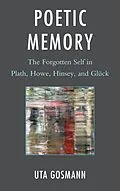How do poems remember? What kinds of memory do poems register that factual, chronological accounts of the past are oblivious to? What is the self created by such practices of memory? To answer these questions, Uta Gosmann introduces a general theory of "poetic memory," a manner of thinking that eschews simple-minded notions of linearity and accuracy in order to uncover the human subject's intricate relationship to a past that it cannot fully know. Gosmann explores poetic memory in the work of Sylvia Plath, Susan Howe, Ellen Hinsey, and Louise Glück, four American poets writing in a wide range of styles and discussed here for the first time together. Drawing on psychoanalysis, memory studies, and thinkers from Nietzsche and Benjamin to Halbwachs and Kristeva, Gosmann uses these demanding poets to articulate an alternative, non-empirical model of the self in poetry.
Autorentext
Uta Gosmann received her Ph.D. in American Literature from the University of Bonn and the University of Paris 7-Denis Diderot. She was awarded fellowships from the German Academic Exchange Service (DAAD) for graduate study at SUNY Buffalo and Yale University. Her critical writing and translations of poetry have appeared in publications in Europe and the United States, including Common Knowledge and Akzente. She is a psychoanalyst in training and lives in New Haven, Connecticut.
Inhalt
1 Introduction
Chapter 2 1. Sylvia Plath: Re-membering the Colossus
Chapter 3 2. Susan Howe's Nonconformist Memorials
Chapter 4 3. Spacing the Past in Ellen Hinsey's Cities of Memory
Chapter 5 4. Psychoanalyzing Persephone: Lousie Glück's Averno
6 Epilogue
7 Notes
8 Bibliography
9 Index
